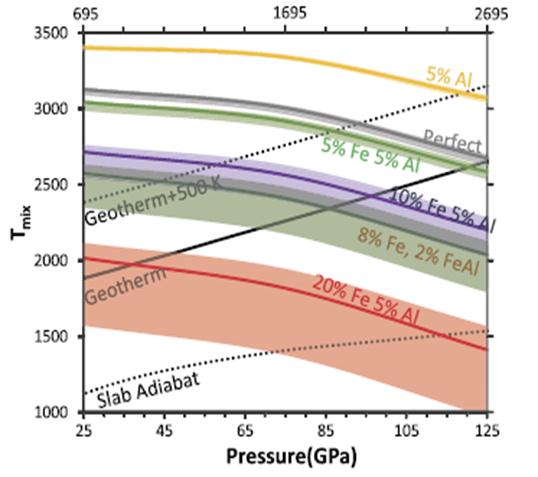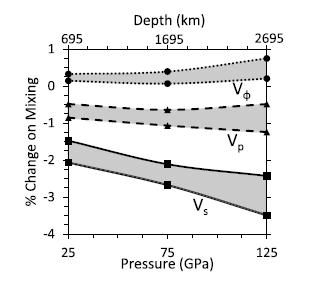Calcium silicate (CaSiO3) perovskite (Ca-pv) and bridgmanite (MgSiO3 perovskite), two of the most abundant minerals in the lower mantle, are potentially miscible due to their similar structural compositions. However, whether the miscibility exists between these phases and the potential geological impact of such miscibility are still unclear.
Dr. Joshua Muir, the postdoctoral researcher, and the team leader Prof. ZHANG Feiwu from the Institute of Geochemistry of the Chinese Academy of Sciences (IGCAS), in collaboration with Dr. Andrew R. Thomson from University College London (UCL), explored the miscibility of Ca-pv and bridgmanite.
Their findings were published in Earth and Planetary Science Letters on May 3.
The researchers found that at 125 GPa (where mixing is the greatest in the pressure range) to mix 1% of Ca-pv into bridgmanite required a temperature of 2042 K, 5% 2588 K, 10% 2675 K and 50% 2743 K, hence Ca-pv and bridgmanite were unlikely to become miscible at conditions of the lower mantle geotherm.
They also employed modelling to figure out whether the presence of other elements influences this mutual solid solution. The results showed that miscibility might become favorable if sufficient concentrations (>1at.%) of additional elements were present.
"Of the elements likely to be present at these concentrations, that Fe(II) increased the miscibility while Al(III) decreased it," said Prof. ZHANG.
Furthermore, static calculations indicated that an anticorrelation of shear wave velocity and bulk sound speed might occur in regions where miscibility is favorable.
Understanding their miscibility will help clarify the structure and properties of the lower mantle, and provide a strong limit to the conditions of the formation and evolution of the Earth.
This study was supported by the National Natural Science Foundation of China and PIFI from Chinese Academy of Sciences.

Fig.1 Projected Tmix for a pyrolytic mixture with various additional elements (Image by IGCAS)

Fig.2 Plot of the change in shear velocity, Vs (solid lines), compressional velocity, Vp (dashed lines), and sound velocity, VΦ (dotted black lines) on converting from a mechanical mixture of Ca-pv and Bridgmanite to a single phase calculated directly (Image by IGCAS)
Contact:
ZHANG Feiwu
Institute of Geochemistry of the Chinese Academy of Sciences
E-mail: zhangfeiwu@mail.gyig.ac.cn
(By Prof. ZHANG Feiwu's group)